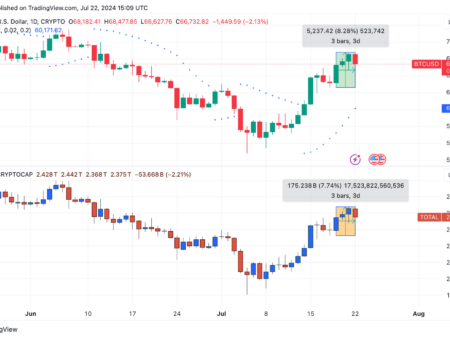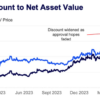The US Securities and Exchange Commission (SEC) confirmed yesterday that it has approved critical rule changes to allow ETFs to hold Ethereum’s native token, ETH. Many people were caught by surprise, considering that just last week almost everyone – from Bloomberg analysts to prediction markets – thought it was a lost cause.
Note: The opinions expressed in this column are those of the author and do not necessarily reflect those of CoinDesk, Inc. or its owners and affiliates.
It never made sense to me why SEC Chairman Gary Gensler would resist approving these spot ETH products, considering how embarrassed the agency was during its proactive fight over the listing of bitcoin ETFs.
Recall that a three-person panel of judges in an appeals court called the SEC’s reasoning for denying (and denying and denying) bitcoin spot funds was “arbitrary and capricious” because it had already approved bitcoin futures products that essentially did the same thing. The same situation occurred for ETH as well, and it is likely that some company would have been happy to pursue the issue in the same way that Digital Currency Group fought for bitcoin ETFs.
This time, the SEC’s decision seems just as arbitrary, just in the opposite direction. In an interview with CoinDesk’s Jesse Hamilton just hours before the approval became public, Gensler said he would follow “how the courts interpret the law” and that “the D.C. Circuit had a different view, and we have taken into consideration and pivoted.”
See also: Ether ETFs overcome major hurdles, even though the SEC has not yet cleared them for trading
So why now? What does this mean for Ethereum in the future? And does this bode well for other cryptocurrencies?
Was the decision politically motivated?
As many have already noticed, it seems that there has been a sea change regarding the regulatory situation of cryptocurrencies. On Thursday, the House voted in historic fashion to pass the most substantial piece of legislation yet dedicated to cryptocurrencies. This came on the heels of both the upper and lower houses of Congress voting to repeal a controversial SEC cryptocurrency custody accounting rule.
With significant Democratic participation in both bills, it appears that the US government’s long war against cryptocurrencies is nearing an end. Notably, President Biden announced that he would not veto the cryptocurrency market structure bill, FIT21, which the White House officially opposes – a rather major concession.
It’s possible that all these events on the Hill acted as a temperature check and helped convince Gensler that his approach to cryptocurrencies was becoming a political risk. After all, former President Donald Trump just announced his major support for cryptocurrencies, and denying ETH ETFs on the grounds, presumably, that the SEC had no “productive” meetings with applicants would be a great weapon.
To be sure, the SEC hasn’t approved the listing of ETH ETFs anytime soon: only the 19b-4 proposals from Cboe, NYSE Arca and Nasdaq, which would allow them to list the funds once companies like Ark Invest, Bitwise, BlackRock, Fidelity, and Grayscale, among others, get their S-1 filings approved. It could take months.
What does this mean for Ethereum?
First, the launch of ETH spot funds means there could soon be a lot more institutional interest in the second largest cryptocurrency. The move not only acted as a sort of stamp of approval, but will also create a familiar on-ramp to purchase the asset for anyone from mom and pop investors looking to diversify their 401(k)s into hedge funds , especially in the financial sector. in the same way as bitcoin ETFs.
“Many people were caught offside by the Ethereum ETF announcement. Even though the Bitcoin ETF has created a roadmap for crypto ETFs for wirehouses and large registered investment advisors, I still expect that many institutional stakeholders are now scrambling to prepare their sales teams on the state of Ethereum and put together the ‘adequate infrastructure,” said Framework Ventures. founder Michael Anderson said in an emailed statement.
And while ETFs are really just a vehicle for gaining exposure to an underlying asset, it’s also possible that these funds actually bring more users onto Ethereum itself. One scenario: Since the SEC likely won’t allow fund managers to stake the underlying ETH, it’s possible that new ether investors decide they want to do it themselves to earn that extra yield of around 3.5%.
Relatedly, as Variant Chief Legal Officer Jake Chervinsky noted on X, the approval likely answers a lingering question: whether or not ETH is a security. Chervinsky said, if these funds were allowed to trade, it would likely mean that unstacked ETH, in particular, would not be seen as a security at the agency. This in itself could spur more institutions to enter the market, considering many are currently holding back simply due to regulatory uncertainty.
On a more technical level, there are many open questions about what it would mean for Ethereum in a world where these funds buy large amounts of ETH (assuming they are as popular) as bitcoin ETFs. To some extent, buying pressure would be notable for the network and surrounding Layer 2s.
Ethereum instituted a burn mechanism that destroys tokens with every transaction, which has long made the asset class deflationary. But, with the growing popularity of L2 and alternative chains like Solana, Ethereum transaction volumes have declined so much that the supply of ETH is growing again, which raises the long-term implications for price and demand of the asset. ETFs could help support the ETH economy.
See also: Ethereum ETF approval could spur ETH’s 60% rally
Ultimately, it will be interesting to see how the funds will affect the economics of staking. Some people have been ringing alarm bells about the amount of ETH being staked, now that applications like Lido make it very easy for people to lock up even small amounts of cryptocurrency. With the possibility of ETFs withdrawing even more ETH from circulation, these concerns could be exacerbated.
What does this mean for chains like Solana?
As mentioned, the approval of ETH ETFs is something of an approval for Ethereum and likely an opportunity for the chain to consolidate its position as an already dominant brand.
“Assuming the Ethereum ETF sees even a fraction of the institutional flows seen by the Bitcoin ETF, I think it’s entirely possible that Ethereum will solidify itself as the unchallenged leader in decentralized app platforms for the next few years, at least in terms of market share and valuation,” Anderson said.
But the move could also open the door for alternative chains such as Cardano, Solana and Ripple to further enter the world of high finance. Of course, Bitcoin and ETH had an easier time (all in perspective) because incumbents like CME had already embraced them. Ether futures have been active on the CME for three years already, while it is not even clear whether other crypto assets are being considered.
It’s also worth noting that while the SEC has hinted that it thinks ETH is a security, the agency has proactively come out and said that assets like SOL, ADA, and ALGO fit the definition outlined by Howey Test used to determine whether something is an investment contract. This could be a bump in the road to a spot SOL ETF.























